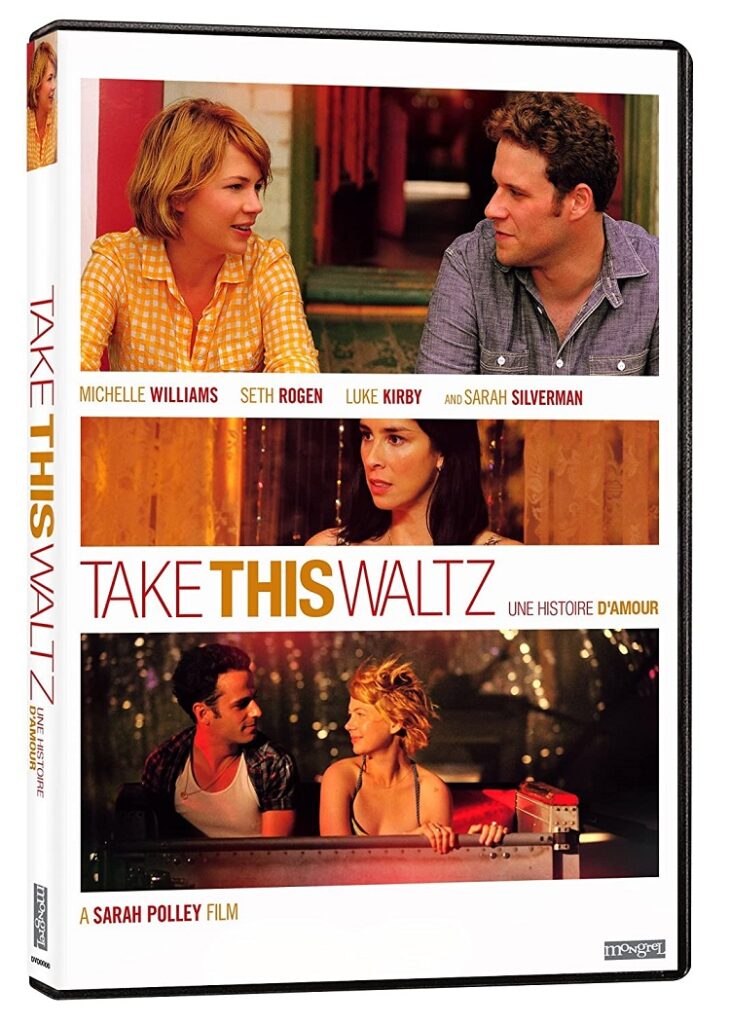
Written by Trisha Stucker
Margot (Michelle Williams) writes travel brochures and is happily married to Lou (Seth Rogen), a cookbook writer. Their marriage is comfortable and quiet, which is just fine until Margot meets and instantly connects with their neighbor, hipster Daniel (Luke Kirby). Suddenly, the status quo is no longer enough. The distance grows between them as Margot feels increasingly attracted to Daniel, and Lou is left in the dark, not sure why the usual is now not good enough for her.
The three main characters are all sympathetic—the viewer feels for Margot’s dilemma, the sudden change of expectations for Lou, and Daniel’s desire to be close to Margot but not wanting to make any decisions for her. No one wants to hurt anyone else, but there is no way all three will be happy by the end.
How can the viewer root for Margot and Daniel when their satisfaction will spell the end of an until-recently happy marriage? How can we root for Margot to shun Daniel and stay committed to Lou when she won’t ever be happy and will spend her life wondering what she missed? This is a hard line for the movie to walk, so much so that a few minutes before the climax the viewer wants one outcome, and a few minutes after regrets that the choice has been made. There is no true satisfactory ending for this story.
Anyone who has felt new love will recognize the appeal of it right away: the object of one’s affections is flawless and might open her up to a world of adventure and constant flutters. Those who’ve never had a long-term loving relationship will swoon with the potential just as the characters do, while those who have had new love grow into lasting love will know that “new things get old” (and that’s okay, as old love can be beautiful in a deeper way).
The interplay between the characters is a mixed bag. Though it is dealing with an extra-marital attraction, Margot and Daniel don’t kiss, don’t touch, hardly even mention feelings… but manage to keep the space between them burning electric and much more sexy than if they’d fallen into bed together. But there’s also a good deal of brooding and staring off into space that is great in preview-length but gets old in movie-length. And then there’s the weird dialogue (Margot and Lou have an odd game of showing how much they love each other by trying to one-up the other with violently gross-out humor) and some really ridiculous lines (Margot explaining how a certain slant of sunlight on the sidewalk can make her want to cry). I know people love Sarah Silverman (who plays Lou’s sister and Margot’s best friend), and she’s okay in this but certainly doesn’t deserve the prominent placement on the DVD cover or previews. From the Making of: Take This Waltz, a bonus feature discussed later, we find out that the director absolutely loves Sarah Silverman, and was star-struck to even meet her. And Silverman for her part seems genuinely touched to have a character written for her that’s not crude.
The DVD includes two main bonus features: “Making Of: Take This Waltz” and “AXS TV: A Look at Take This Waltz.”
“Making Of” is a valuable documentary that sheds light on the way the actors and director/writer see the characters and the themes. Michelle Williams’ comments show how much she identifies with her character—she seems to possess the young worldview of the character and not quite the wisdom of the director. In her words, life is too odd and hard “not to try to get more of what you want.” Seth Rogen’s interview gives an interesting slant on his character, as the guy that isn’t even aware he’s in this movie that everyone else is in. He says, “If it were Lou’s movie, it would be about a guy who writes a chicken cookbook and then finds out his wife is cheating on him.” Luke Kirby sounds like the same hipster he plays in the film, and honestly seems high in the interview. About the director, he mumbles, “She’s calm and grounded and present, and there’s no need to be embarrassed because of whatever truth she carries.” Hmmm… okay… can we cut back to Rogen or Sarah Polley, the director?
The most valuable part of the documentary is hearing the director discuss her vision—it just shows the wisdom Sarah Polley really has about her subject. She talks the movie as a very late coming-of-age film, and that the characters probably should have figured this stuff out long before they were nearly 30. She wanted to explore desire, and how we live in a culture where if we’re feeling any emotion other than constant happiness we’re told there’s something missing and not filling it means we’ve failed.
The second bonus feature, “AXS TV: Take This Waltz” is basically a four-minute version of the preview interspersed with the actors’ comments about it on the red carpet at the Tribeca Film Festival (and can be skipped).
Even with walking the line of pretentiousness and dipping into it a few times, this is a well-made movie: the score, the camera work, and the actors that disappear into their characters. Still, as much as I continue to love the move trailer, and though I’m glad I saw the actual movie, I can’t say it is entertaining or satisfying. In fact, I can only recommend it if the viewer also is sure to watch the bonus feature “Making Of: Take This Waltz.”